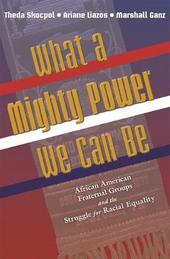
|
What a Mighty Power We Can Be: African American Fraternal Groups and the Struggle for Racial Equality
Paperback / softback
Main Details
| Title |
What a Mighty Power We Can Be: African American Fraternal Groups and the Struggle for Racial Equality
|
| Authors and Contributors |
By (author) Theda Skocpol
|
|
By (author) Ariane Liazos
|
|
By (author) Marshall Ganz
|
| Series | Princeton Studies in American Politics: Historical, International, and Comparative Perspectives |
|---|
| Physical Properties |
| Format:Paperback / softback | | Pages:320 | | Dimensions(mm): Height 229,Width 152 |
|
| ISBN/Barcode |
9780691138367
|
| Classifications | Dewey:061.30896073 |
|---|
| Audience | | Professional & Vocational | | Tertiary Education (US: College) | |
|---|
| Illustrations |
8 halftones. 8 line illus. 14 tables.
|
|
Publishing Details |
| Publisher |
Princeton University Press
|
| Imprint |
Princeton University Press
|
| Publication Date |
17 August 2008 |
| Publication Country |
United States
|
Description
From the nineteenth through the mid-twentieth centuries, millions of Americans participated in fraternal associations - self-selecting brotherhoods and sisterhoods that provided aid to members, enacted group rituals, and engaged in community service. This book shows how African American groups played key roles in the struggle for civil rights.
Author Biography
Theda Skocpol is the Victor S. Thomas Professor of Government and Sociology at Harvard University. Ariane Liazos received her Ph.D. in history from Harvard and is currently an independent scholar. Marshall Ganz is lecturer in public policy at Harvard's Kennedy School of Government.
ReviewsCo-Winner of the 2007 Oliver Cromwell Cox Award, Race, Gender, and Class Sectionof the American Sociological Association "Heavily researched and illuminating throughout, this unique study is not necessarily a book for the masses, but for those, mostly in academia, interested in examining a little-considered dimension in the complex history of the civil rights movement, and out civil society as a whole."--Publishers Weekly "This excellent, very readable, scholarly book fills many gaps in understanding the African American community."--Choice
|